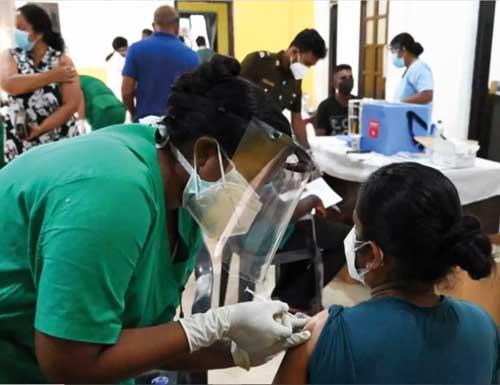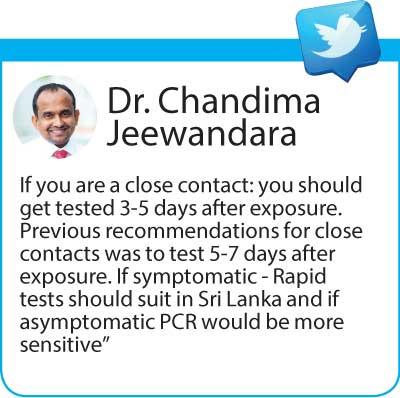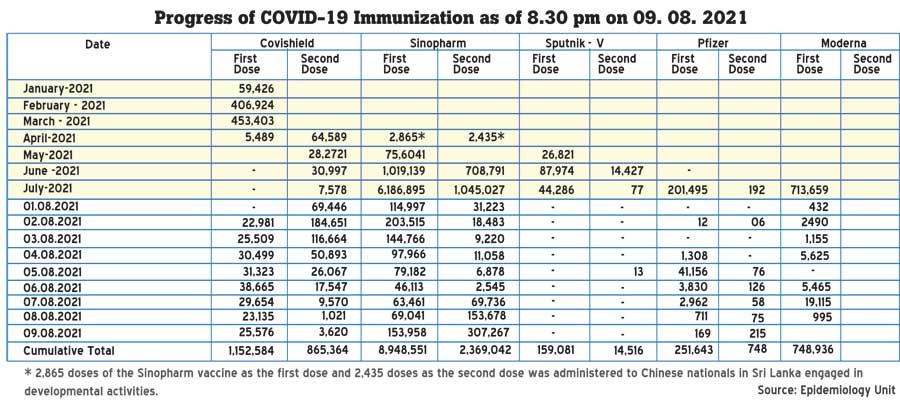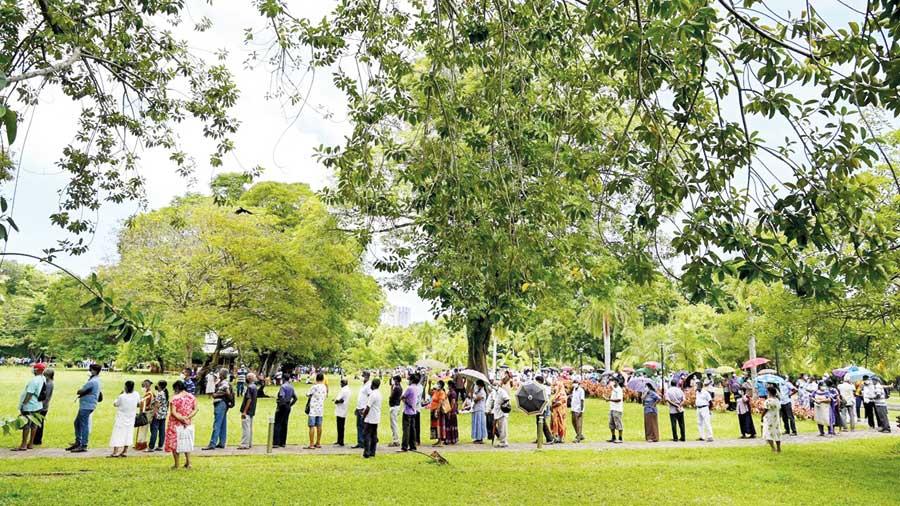11 Aug 2021 - {{hitsCtrl.values.hits}}

@Piyumi Fonseka & @Kalani Writes on Twitter
How did we get here?
Sri Lanka is in crisis. Since April 2021, Sri Lanka saw a sharp increase of Covid-19 positive cases and deaths. Despite health authorities warning the public to limit celebrations and shopping sprees during the traditional new year festival, large gatherings and cross border travels resulted in a deadly spike of Covid-19 cases. However the dominant disease variant at the time was the Covid-19 variant also known as the UK variant. It must be noted that this variant was also considered a highly contagious variant before the Delta variant began to wreak havoc in India, where it was first detected.
"The WHO last week urged nations worldwide to halt programmes to give third booster shots to their already vaccinated citizens"
On June 17, 2021 Director of Operations and Clinical Services at Allergy Immunology and Cell Biology Unit, University of Sri Jayewardenepura Dr. Chandima Jeewandara tweeted “Worst we could have imagined. B.1.617.2 was detected in Colombo. Remember it’s 50% faster than B116; more severe and evades one dose vaccine.” True to Dr. Jeewandara’s warnings by August, hospitals across the island are incapacitated with Covid-19 patients with the rapid spread of the Delta variant across the country.
Why is Delta deadly?
According to an internal document of the United States Centre for Disease Control (CDC) the Delta variant is much more contagious and more likely to break through the protections given by the vaccines. It also said that Delta may cause more severe diseases than all the other known variants of the virus.
While much of the world had an idea of how dangerous this variant is, the CDC document gave a clear idea about how transmissible this virus is. According to the CDC, the Delta variant is more transmissible than the viruses which cause MERS, SARS, Ebola and the smallpox. Frighteningly the report also compared its transmissibility to chickenpox, which is as easily contagious as the Delta variant of Covid-19.
What’s worrisome however is that the CDC, according to a Washington Post article said that ‘the war has changed”. It indicated the struggle of a wealthy nation such as the United States and its depicted its top public health agency’s struggles to stay with the Covid-19 prevention measures and to encourage vaccination. Several months earlier this year, the US health agencies relaxed it’s advice on mask-wearing as numbers began to decline with accelerated vaccines. However with the emergence of the Delta variant, the CDC document reveals the urgency to renew its response to a virus strain which acts almost as a novel virus. It also reveals how wealthy nations struggle with this variant and that countries such as India or Sri Lanka are not alone in the battle against Delta.
Meanwhile Dr. Chandima Jeewandara citing recent CDC guidance noted how the response to Covid-19 Delta variant has changed. “Recent CDC guidance: If you are a close contact: you should get tested 3-5 days after exposure. Previous recommendations for close contacts was to test 5-7 days after exposure. If symptomatic - Rapid tests should suit in Sri Lanka and if asymptomatic PCR would be more sensitive” Dr. Jeewandara said taking to twitter. He also highlighted that this was his personal opinion — not the Sri Lankan official guideline. Dr. Jeewandara added that many undergo testing for Covid-19 soon after exposure and get a false sense of reassurance.
Head of the Department of Immunology and Molecular Medicine at the University of Sri Jayewardenepura Prof. Neelika Malavige also taking to twitter said that given the highly transmissible nature of the virus indoor gatherings must be stopped immediately. “Fine aerosols produced by talking and singing contains more SARS-CoV-2 copies than coarse aerosols and may play a significant role in SARS-CoV-2 transmission,” Prof. Malavige said. “This is precisely why large indoor gatherings should be stopped right now, until a large proportion of the adult population are fully vaccinated (2 weeks after the second dose),” she added.
"The Delta variant is more transmissible than the viruses which cause MERS, SARS, Ebola and smallpox. The report also said the variant is as contagious as chickenpox"
Do lockdowns work?
Sri Lanka responded early to the initial wave of the pandemic early in 2020, with islandwide lockdowns which had varied impacts on different segments of society. As the curfews were lifted various strains began to emerge and gradually spread across the country since then.
While several medical and healthcare professionals urge an immediate and temporary lockdown or travel restrictions to be imposed, certain professionals disagree that it would aid the current situation in any way. It is almost certain that yet another lockdown will bring economic activities in Sri Lanka to a halt, will it really help curb the rapid spread of the virus? Senior Professor Sudantha Liyanage believes otherwise. Professor Liyanage is also the Vice-Chancellor of the University of Sri Jayewardenepura, which has contributed immensely in the country’s battle against the deadly COVID-19 pandemic. The university was tasked with carrying out the most vital research and studies on SARS-CoV-2 and its variants.
"Local data have already shown that decades of hard work and capital accumulation have been lost for some"
What will keep the pandemic at bay?
Several months ago, harsh measures were warranted by the government to abate the virus spread. However, after the restrictions were eased, the number of Coronavirus-positive cases and deaths skyrocketed. Despite this backdrop, Prof. Liyanage stressed that what works in the battle against this pandemic is nothing but vaccines.“We tried lockdowns. We tried travel restrictions, but the numbers did not change that much. What Sri Lankans need right now is increased vaccination rates to keep this fatal pandemic at bay,” Prof. Liyanage opined.
As the World Health Organization specifies, herd immunity, also known as 'population immunity', is the indirect protection from an infectious disease that happens when a population is immune either through vaccination or immunity developed through the previous infection. The WHO supports achieving 'herd immunity' through vaccination, but not by allowing the disease to spread uncontrolled through any segment of the population, as this would result in unnecessary deaths. Prof. Liyanage stressed that herd immunity against COVID-19 should be achieved by protecting people through vaccination, not by exposing them to the virus or keeping them indoors for prolonged periods of time. “Achieving herd immunity with safe and effective vaccines makes the diseases rarer and saves lives.”
In the Sri Lankan context, according to Army Commander General Shavendra Silva who leads the state’s COVID-19 task force, preparations were being made for a third dose booster following a discussion with President Gotabaya Rajapaksa on August 06. However, only about 50 percent of the population have been vaccinated but with one dose. About 13.8 percent with two doses by August 08, 2021, have received a vaccine. Meanwhile the WHO last week urged nations worldwide to halt programmes to give third booster shots to their vaccinated citizens.
The WHO’s Chief Dr. Tedros Adhanom Ghebreyesus said that as the gap between vaccinations in wealthy and poor countries widen, wealthy nations need to support lower income countries in securing the vaccines needed for their citizens.
"I understand the concern of all governments to protect their people from the Delta variant. But we cannot accept countries that have already used most of the global supply of vaccines using even more of it," Tedros said in the strongest statement the WHO has offered in support of vaccine equity.
"While several medical professionals urge an immediate lockdown to be imposed, certain professionals disagree that it would aid the current situation in any way"
On the brink of bankruptcy?
Due to the negative impact caused by the pandemic-related restrictions on the Sri Lankan economy and especially small businesses, questions have arisen about the viability of many sectors. Will the workers remain with the previous firms as lockdowns persist or will they move on to other jobs? Will the firms themselves survive? Will there be a string of bankruptcies? Local data have already shown that decades of hard work and capital accumulation have been lost for some.
“Let’s be honest about the lockdowns and curfews. With the crushing social and economic costs that lockdowns bring, we now know just how catastrophic lockdowns are. Small businesses didn’t survive at all. It only adds up to economic misery and affects the livelihoods of many who barely survive with wages,” Prof. Liyanage explained. He is of the view that if another lockdown comes, the citizens will have to pay a heavy price both in terms of life and livelihood.
Shedding light on the economic downfall, Prof. Liyanage said lockdowns are perceived as temporary solutions for a national crisis like COVID-19. “We can tell people to stay home and mask-up, but government demands don’t necessarily result in compliance. If new lockdowns were to be ordered, compliance would largely depend on the people. We know how our people violate travel restrictions and health guidelines. We should remember it was the countries and localities with high vaccination rates that have shown low numbers of hospitalization and death.
The global picture speaks a thousand words
The global picture supports Prof. Liyanage’s opinion. The countries with wider vaccination coverage are reporting slower infections and fewer deaths, paving the way for their faster return to normalcy. A recent McKinsey report has said that the success in the vaccination drive boosted the confidence in developed countries, where fewer executives now see Covid-19 as the number one threat for economic growth.
Bangladesh media and their experts have also linked the country's recovery until mid-March to business and consumer confidence boosted by the launching of vaccination. Countries see success in taming infections and deaths by pacing up vaccination.
Our closest neighbor India has vaccinated 4.1% of its population, which helped the country to bring down daily infections to 45,699 and deaths to 816 just in a month from their May peaks of over 4 lakh and 4,896.
The USA, though tops the global chart of infections and deaths, now sees a steady fall in both counts as the country heightened its vaccination drive, inoculating more than 46% of its population. Daily infections dropped to 11,427 on 29 June from a peak of 3 lakh on 8 January this year. Daily deaths came down abruptly to 294 on June 29 from a whopping 4,463 on 12 January.
In contrast, Vietnam, which was so far able to keep Covid deaths as low as 80 by non-pharmaceutical measures, now sees a rise in infection due to its lower rate of vaccination, just 0.2% coverage.

Health authorities strongly advise the public to strictly adhere to the instructions given below

28 Dec 2024 2 hours ago
28 Dec 2024 2 hours ago
28 Dec 2024 3 hours ago
28 Dec 2024 3 hours ago